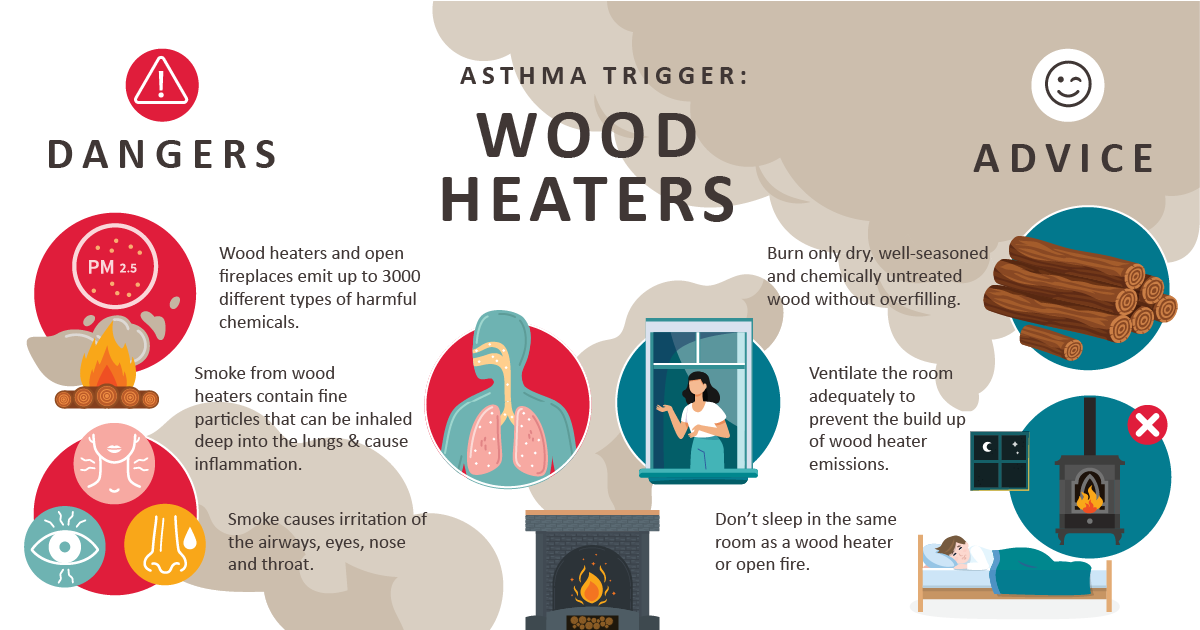The Woolcock Institute of Medical Research

Navigating the embers: Wood heaters and their impact on those with asthma
In the third of the Asthma Week series covering known triggers in the home for people with asthma, the Woolcock’s Dr Christine Cowie talks about wood heaters and open fireplaces.
For many, the charm of an open fire extends beyond its value as a practical source of warmth – gathering the wood, watching the flames come to life, the crack and pop, the gentle heat, roasting marshmallows and curling up fireside with a hot chocolate. Researchers warn, though, that the romance of wood fires comes at a high price for respiratory health.
Wood heaters and open fireplaces emit up to 3000 different types of chemicals including high emissions of fine particulate matter into the home and surrounding community. Fine particles are known as PM2.5, due to their size of 2.5 µm diameter which is less than one thirtieth of the width of a strand of hair, and which enables these particles to be breathed deeply into the lungs.
In Sydney, about 5% of households have wood heaters but they contribute approximately 50% of PM2.5 emissions into the air we breathe. In regional towns in colder climates this percentage can be much greater. PM2.5 is especially irritating to the airways of people with asthma and other respiratory diseases causing respiratory and asthma exacerbations and can also cause irritation to the eyes, nose and throat.
“Given that wood heaters are one of the main contributors of PM2.5 in Sydney, we should be adopting policies to ban wood heaters and fireplaces in major urban areas, as well as in regional areas that suffer from elevated wintertime particle pollution” said Dr Christine Cowie. “People need to understand that wood heater emissions are not safe and in fact they contribute more particle pollution than do cars, even in Sydney. Just as there has been a lot of discussion about phasing out gas appliances, we need to start conversations about the harms of wood heater emissions as well.”
CAN WE MINIMISE THE RISK?
Aside from converting to a cleaner (electrical) form of heating which we highly recommend, if you must use your wood heater, there are some factors that can help reduce emissions.
- Be efficient – Properly stacking and arranging kindling and fuel can help the fire to catch quickly and burn cleanly and reduce the amount of smoke and particulate matter produced.
- Use quality timber or clean burning pellets – Using dry, well-seasoned wood is crucial. Avoid using green or wet wood, or chemically treated wood as it produces more smoke as it burns.
- Prevent smouldering – Allowing a fire to smoulder can lead to more irritants for those with asthma and respiratory diseases. Adequate oxygen supply for the fire is essential for clean and efficient combustion.
- Close the heater door – Closing the door as soon as possible helps control the airflow and minimises the escape of pollutants into the room.
- Clean the flue/chimney – Essential to ensure good ventilation. A dirty flue/chimney can lead to backdrafts.
- Proper sizing – Choose a fireplace or stove that is appropriately sized for the space you are heating.
Together with researchers from the Australian National University (ANU) and CSIRO, the Woolcock’s Respiratory and Environmental Epidemiology research group is looking at whether air filtration units may help to reduce the impact of wood heaters on respiratory health. “We will be conducting a small pilot study next year to investigate whether air filtration units are effective in reducing PM pollution in houses with wood heaters and the effects this will have on people with asthma,” says Dr Cowie.
“However, as public health practitioners we prefer to prevent pollution problems in the first place, and so recommend there be a call for policy development and legislation preventing the installation of new wood heaters in urban areas and in new builds”.
Find out more











